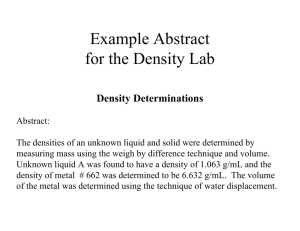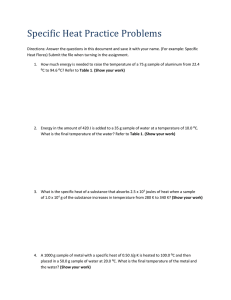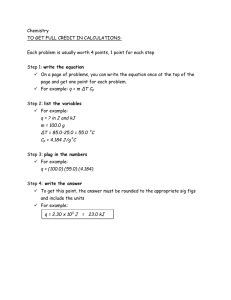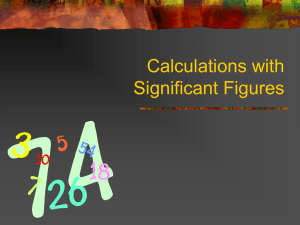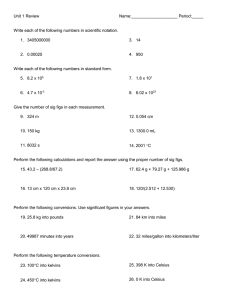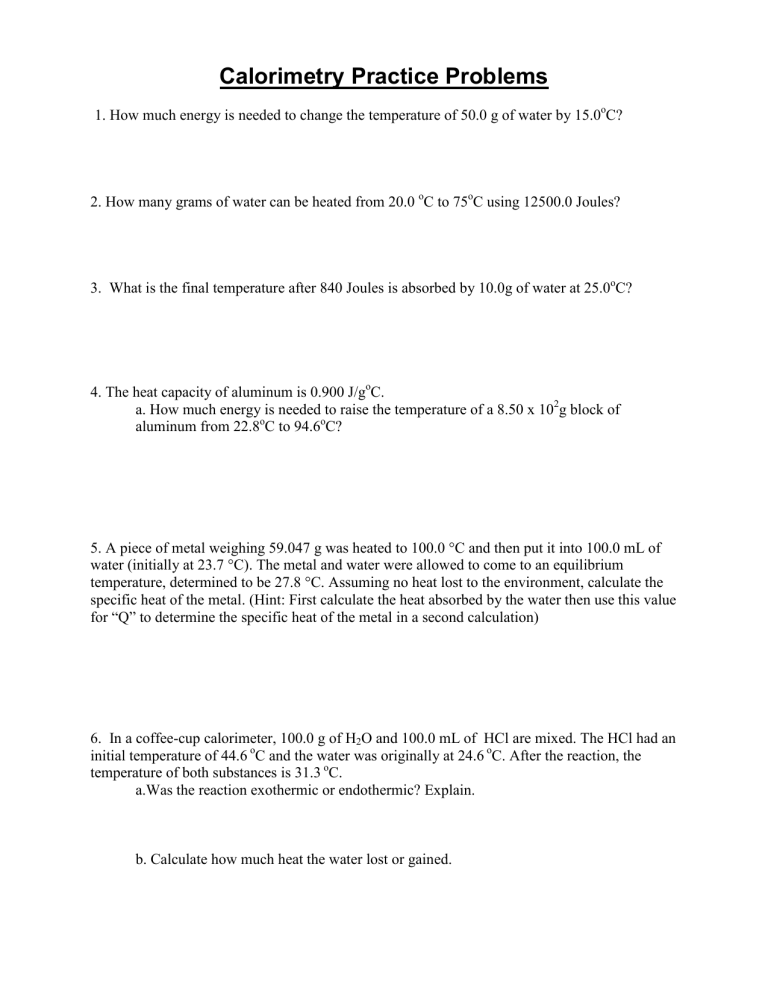
Calorimetry Practice Problems 1. How much energy is needed to change the temperature of 50.0 g of water by 15.0oC? 2. How many grams of water can be heated from 20.0 oC to 75oC using 12500.0 Joules? 3. What is the final temperature after 840 Joules is absorbed by 10.0g of water at 25.0oC? 4. The heat capacity of aluminum is 0.900 J/goC. a. How much energy is needed to raise the temperature of a 8.50 x 102g block of aluminum from 22.8oC to 94.6oC? 5. A piece of metal weighing 59.047 g was heated to 100.0 °C and then put it into 100.0 mL of water (initially at 23.7 °C). The metal and water were allowed to come to an equilibrium temperature, determined to be 27.8 °C. Assuming no heat lost to the environment, calculate the specific heat of the metal. (Hint: First calculate the heat absorbed by the water then use this value for “Q” to determine the specific heat of the metal in a second calculation) 6. In a coffee-cup calorimeter, 100.0 g of H2O and 100.0 mL of HCl are mixed. The HCl had an initial temperature of 44.6 oC and the water was originally at 24.6 oC. After the reaction, the temperature of both substances is 31.3 oC. a.Was the reaction exothermic or endothermic? Explain. b. Calculate how much heat the water lost or gained. Calorimetry Practice Problems (Answers) 1. How much energy is needed to change the temperature of 50.0 g of water by 15.0oC? 3135J 3140J (rounded answer for sig. figs.) 2. How many grams of water can be heated from 20.0 oC to 75oC using 12500.0 Joules? 119.6 g 120 g (rounded answer for sig. figs) 3. What is the final temperature after 840 Joules is absorbed by 10.0g of water at 25.0oC? ∆T= 20.1 oC Tf= 25.0 + 20.1= 45.1oC 4. The heat capacity of aluminum is 0.900 J/goC. a. How much energy is needed to raise the temperature of a 8.50 x 102g block of aluminum from 22.8oC to 94.6oC? 54927J 54900J (rounded answer for sig. figs.) 5. A piece of metal weighing 59.047 g was heated to 100.0 °C and then put it into 100.0 mL of water (initially at 23.7 °C). The metal and water were allowed to come to an equilibrium temperature, determined to be 27.8 °C. Assuming no heat lost to the environment, calculate the specific heat of the metal. (Hint: First calculate the heat absorbed by the water then use this value for “Q” to determine the specific heat of the metal in a second calculation) Qwater= 1713.8 J Cmetal= 0.402 J/g oC 6. In a coffee-cup calorimeter, 100.0 g of H2O and 100.0 mL of HCl are mixed. The HCl had an initial temperature of 44.6 oC and the water was originally at 24.6 oC. After the reaction, the temperature of both substances is 31.3 oC. a.Was the reaction exothermic or endothermic? Explain. For the water- endothermic. The temperature increased from 24.6 oC to 31.3 oC indicating energy was absorbed by the water. For the HCl- exothermic. The temperature decreased from 44.6 oC to 31.3 oC indicating energy was released by the HCl. b. Calculate how much heat the water lost or gained. Qwater= 2800.6 J 2.8 x 103J (answer rounded for sig. figs.)
